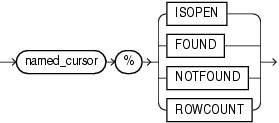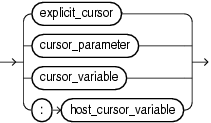| Oracle® Database PL/SQL Language Reference 11g Release 2 (11.2) E25519-09 |
|
|
PDF · Mobi · ePub |
| Oracle® Database PL/SQL Language Reference 11g Release 2 (11.2) E25519-09 |
|
|
PDF · Mobi · ePub |
Every named cursor (explicit cursor or cursor variable) has four attributes, each of which returns information about the execution of a DML statement.
Note:
You can use cursor attributes only in procedural statements, not in SQL statements.

named_cursor%ISOPEN has the value TRUE if the cursor is open, and FALSE if it is not open.
named_cursor%FOUND has one of these values:
If the cursor is not open, INVALID_CURSOR
If cursor is open but no fetch was attempted, NULL.
If the most recent fetch returned a row, TRUE.
If the most recent fetch did not return a row, FALSE.
named_cursor%NOTFOUND has one of these values:
If cursor is not open, INVALID_CURSOR.
If cursor is open but no fetch was attempted, NULL.
If the most recent fetch returned a row, FALSE.
If the most recent fetch did not return a row, TRUE.
named_cursor%ROWCOUNT has one of these values:
If cursor is not open, INVALID_CURSOR.
If cursor is open, the number of rows fetched so far.
Name of an explicit cursor.
Name of a formal cursor parameter.
Name of a cursor variable.
Name of a cursor variable that was declared in a PL/SQL host environment and passed to PL/SQL as a bind variable. Do not put space between the colon (:) and host_cursor_variable.